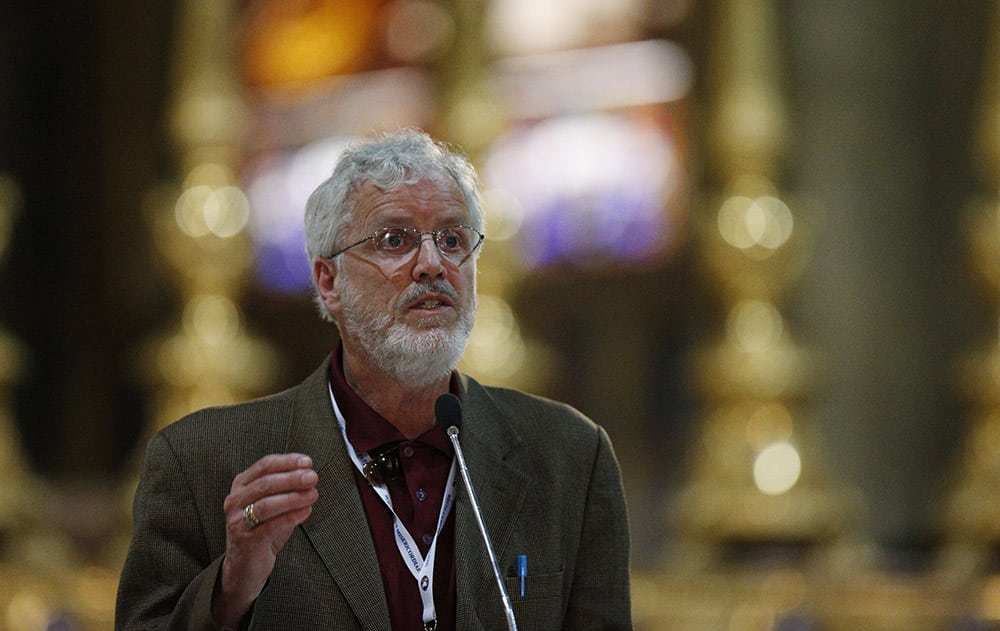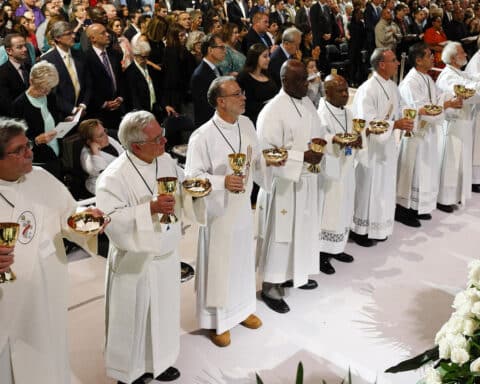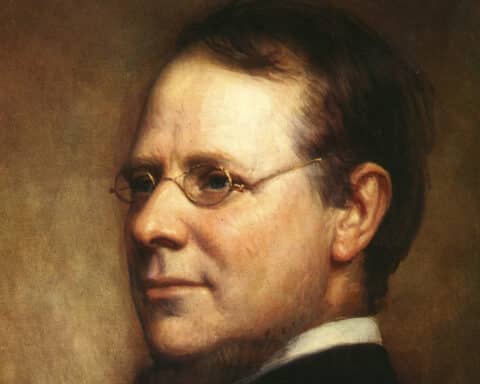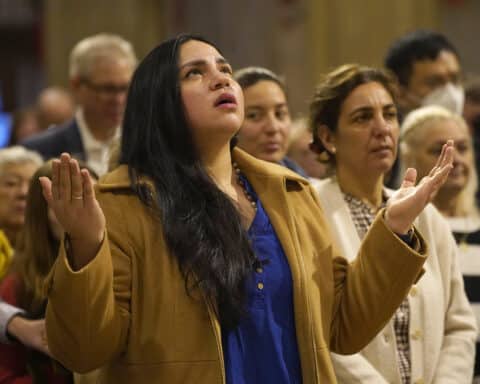As intermediaries between the bishops and the laity, permanent deacons within the Church can help resolve conflict, said Bishop W. Shawn McKnight of Jefferson City, Missouri, and author of “Understanding the Diaconate: Historical, Theological, and Sociological Foundations” (CUA Press, $29.95). “There is a lot of conflict in the Church that needs to be resolved, and perhaps the Holy Spirit and the mind of Christ is providing us with a tool … that can help the Church resolve this kind of division.”
Because few deacons have been mentioned in reports of Church scandals, said Deacon Harold Burke-Sivers of Portland, Oregon, who is a speaker, life coach, author, and host of TV and radio programs, they can credibly reach out to Catholics frustrated with the Church. “This is an opportunity for deacons to come to the floor, while everybody’s saying, ‘I’m going to leave the Church because of all this,” he said.
While part of a deacon’s mission is to evangelize outside of the Church, Deacon Dan Brewer is starting at the parish with Catholics who come to Mass but haven’t truly embraced the Faith. To reach marginally involved Catholics who attend Transfiguration Catholic Church in Oakdale, Minnesota, as well as new parishioners, Deacon Brewer is working with the parish to establish a welcoming ministry.
“It’s the basic idea of opening your arms wide in welcome, listening to their story, finding out where they’re at, telling them about everything that’s going on at the parish and then making practical steps to get them integrated,” he said. “It’s just caring for people.”
“There’s plenty of work in our own Church for deacons to evangelize,” agreed Deacon James Keating, director of theological formation at the Institute for Priestly Formation at Creighton University in Omaha, Nebraska.
“There are lots of opportunities. We have to get our own people back.”
Evangelization
While many Catholics have received the sacraments, they haven’t been evangelized, said Deacon Ralph Poyo, founder of New Evangelization Ministries based in Steubenville, Ohio, which works with parishes to foster parish renewal. The deacon’s ministry is primarily outside the parish, he said. “The local parish needs to be the bus station from which the deacon leaves to go out and do ministry and return to.”
Priests serve more in the parish while deacons are sent out to be the eyes and ears of the bishop in the wider community, Deacon Burke-Sivers said. Because many have families and secular jobs, they offer direct understanding of marriage and family issues.
Deacon Steve Mitchell of New Boston, Michigan, said laypeople see him as a regular guy. “I have a mortgage, kids, a wife and grandkids, and for some people I can be more relatable,” he said.
Church leaders should recognize deacons as experts on the laity’s views on certain issues, Bishop McKnight said. “They have the ability or the means to raise those concerns, those needs and desires of the Christian faithful to the shepherds.”
Deacon Brewer and other permanent deacons are embracing their evangelistic role through distinct apostolates that give them unique opportunities to share in the work of the New Evangelization by helping Catholics go deeper in their faith and serving as bridges between the bishop and the laity.
Connecting with laity
“When bishop sends a deacon, he sends him into the lives of laypeople with one particular goal, and that is to preach the word of God in the context of secular culture,” said Deacon Keating. “From the very beginning in the Book of Acts, and then as it developed theologically, the diaconate has always been focused on evangelization.”
Deacons also are ministers of charity, not just through their own works but in how they animate the laity to carry out their witness of the Church, Bishop McKnight said.
Deacons can bring parish care to those outside it, Deacon Burke-Sivers said. They convey, “We still love you. You’re still part of our family. You’re still connected, whether a person is in a prison, in a hospital, in hospice, in a nursing home, in their own home. The deacon acts as that connector and that bridge.”
New apostolate
The permanent diaconate could better reflect lay involvement, Deacon Mitchell said, noting that St. Paul, in his Letter to the Ephesians, writes about deacons who administer to the saints.
Deacon Mitchell and a team in the Archdiocese of Detroit are developing a ministry called Acts XXIX — Mobilizing for Mission, which will equip laypeople to form others into “disciple-makers,” who will then evangelize other Catholics.
More deacons could develop unique apostolates, Deacon Burke-Sivers said. “There are so many different places that we could go [within] our sphere of influence where there are people we’re engaging with.”
Regardless of the apostolic work deacons do, effective evangelization isn’t so much about programs, he said.
“Ultimately it’s about showing people the love of Jesus and how it matters in their life every day when they’re making decisions.”
Susan Klemond writes from Minnesota.





